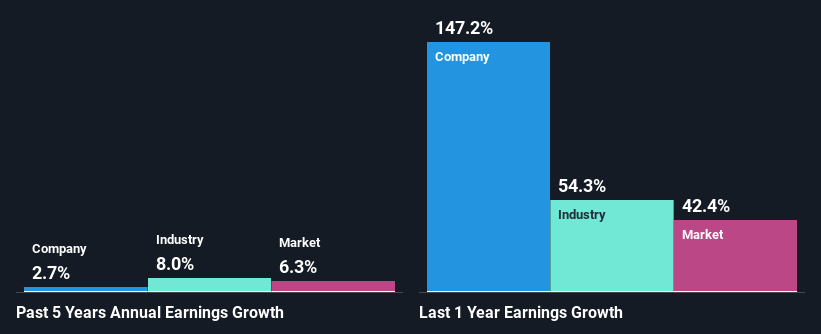Vesuvius plc (LON:VSVS) Stock's Been Sliding But Fundamentals Look Decent: Will The Market Correct The Share Price In The Future?
With its stock down 8.6% over the past three months, it is easy to disregard Vesuvius (LON:VSVS). But if you pay close attention, you might find that its key financial indicators look quite decent, which could mean that the stock could potentially rise in the long-term given how markets usually reward more resilient long-term fundamentals. In this article, we decided to focus on Vesuvius' ROE.
Return on equity or ROE is a key measure used to assess how efficiently a company's management is utilizing the company's capital. Put another way, it reveals the company's success at turning shareholder investments into profits.
Check out our latest analysis for Vesuvius
How Do You Calculate Return On Equity?
Return on equity can be calculated by using the formula:
Return on Equity = Net Profit (from continuing operations) ÷ Shareholders' Equity
So, based on the above formula, the ROE for Vesuvius is:
9.8% = UK£108m ÷ UK£1.1b (Based on the trailing twelve months to December 2021).
The 'return' is the profit over the last twelve months. One way to conceptualize this is that for each £1 of shareholders' capital it has, the company made £0.10 in profit.
What Is The Relationship Between ROE And Earnings Growth?
So far, we've learned that ROE is a measure of a company's profitability. We now need to evaluate how much profit the company reinvests or "retains" for future growth which then gives us an idea about the growth potential of the company. Generally speaking, other things being equal, firms with a high return on equity and profit retention, have a higher growth rate than firms that don’t share these attributes.
Vesuvius' Earnings Growth And 9.8% ROE
To start with, Vesuvius' ROE looks acceptable. And on comparing with the industry, we found that the the average industry ROE is similar at 12%. Despite the modest returns, Vesuvius' five year net income growth was quite low, averaging at only 2.7%. We reckon that a low growth, when returns are moderate could be the result of certain circumstances like low earnings retention or poor allocation of capital.
Next, on comparing with the industry net income growth, we found that Vesuvius' reported growth was lower than the industry growth of 8.0% in the same period, which is not something we like to see.
Earnings growth is an important metric to consider when valuing a stock. It’s important for an investor to know whether the market has priced in the company's expected earnings growth (or decline). Doing so will help them establish if the stock's future looks promising or ominous. If you're wondering about Vesuvius''s valuation, check out this gauge of its price-to-earnings ratio, as compared to its industry.
Is Vesuvius Efficiently Re-investing Its Profits?
Despite having a moderate three-year median payout ratio of 43% (implying that the company retains the remaining 57% of its income), Vesuvius' earnings growth was quite low. Therefore, there might be some other reasons to explain the lack in that respect. For example, the business could be in decline.
In addition, Vesuvius has been paying dividends over a period of at least ten years suggesting that keeping up dividend payments is way more important to the management even if it comes at the cost of business growth. Our latest analyst data shows that the future payout ratio of the company over the next three years is expected to be approximately 47%. Still, forecasts suggest that Vesuvius' future ROE will rise to 12% even though the the company's payout ratio is not expected to change by much.
Summary
In total, it does look like Vesuvius has some positive aspects to its business. Although, we are disappointed to see a lack of growth in earnings even in spite of a high ROE and and a high reinvestment rate. We believe that there might be some outside factors that could be having a negative impact on the business. That being so, the latest analyst forecasts show that the company will continue to see an expansion in its earnings. To know more about the company's future earnings growth forecasts take a look at this free report on analyst forecasts for the company to find out more.
Have feedback on this article? Concerned about the content? Get in touch with us directly. Alternatively, email editorial-team (at) simplywallst.com.
This article by Simply Wall St is general in nature. We provide commentary based on historical data and analyst forecasts only using an unbiased methodology and our articles are not intended to be financial advice. It does not constitute a recommendation to buy or sell any stock, and does not take account of your objectives, or your financial situation. We aim to bring you long-term focused analysis driven by fundamental data. Note that our analysis may not factor in the latest price-sensitive company announcements or qualitative material. Simply Wall St has no position in any stocks mentioned.

 Yahoo Finance
Yahoo Finance 
